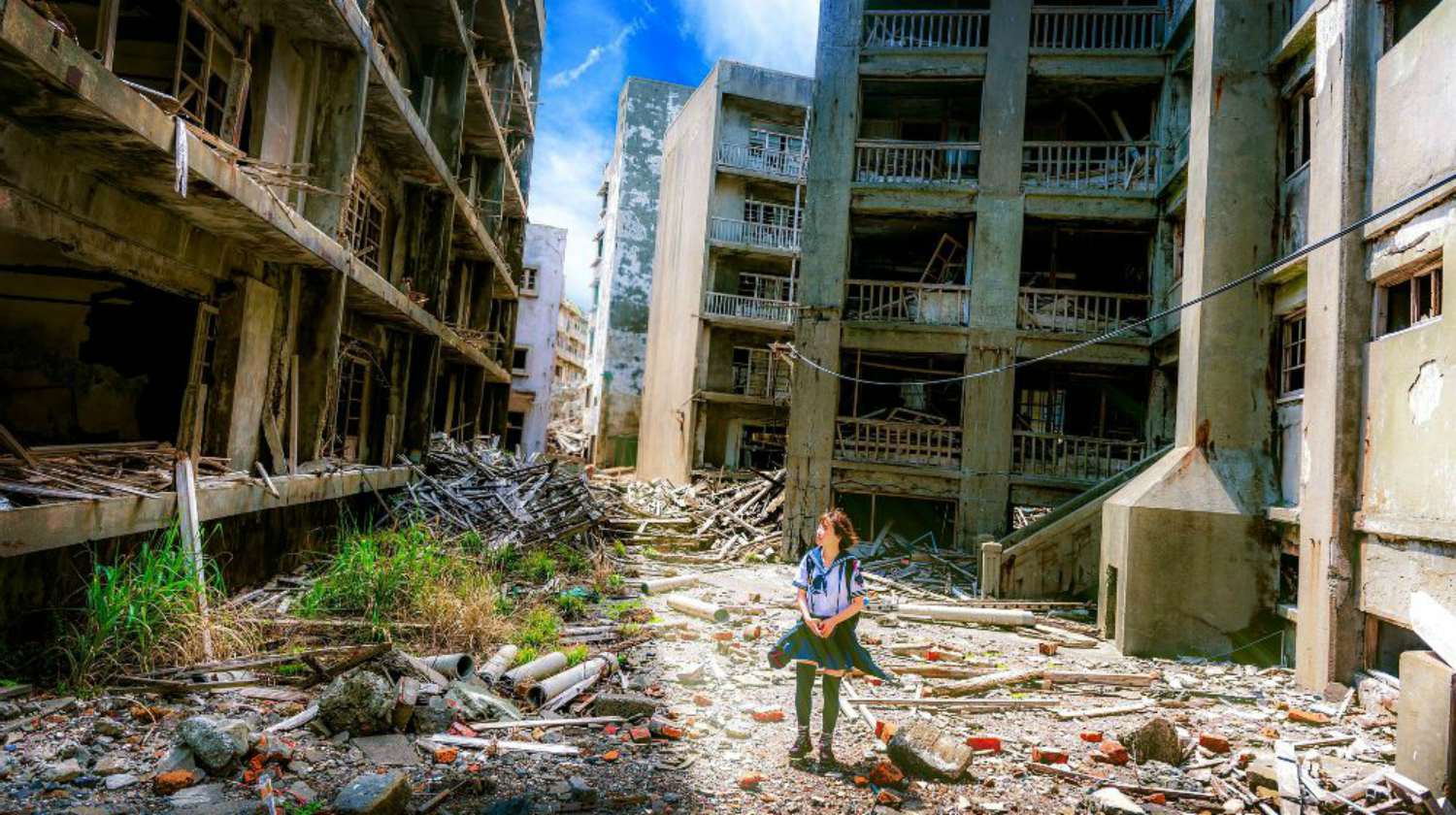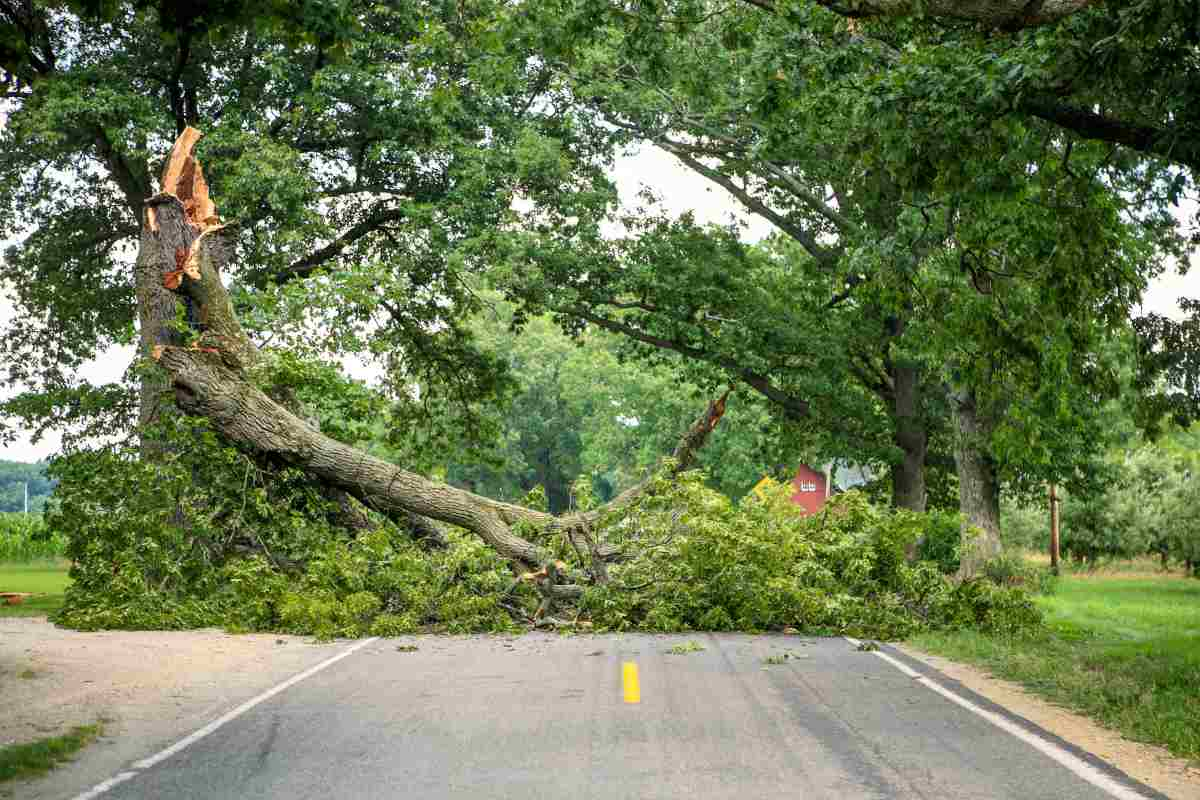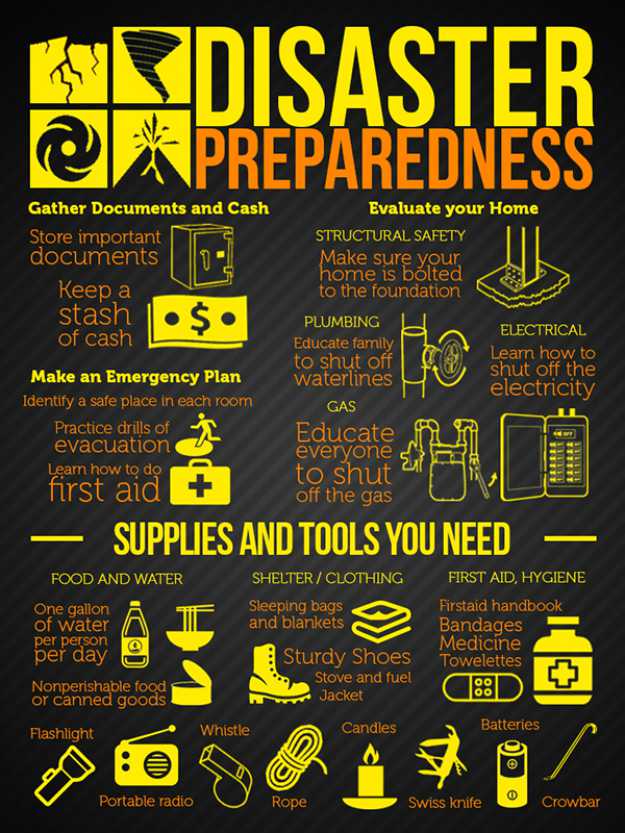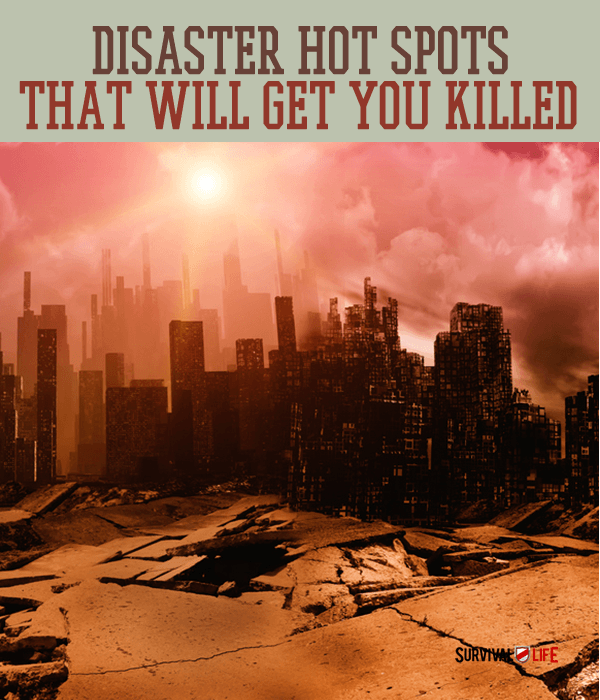Evacuation Planning
Disaster Hot Spots That Will Get You Killed

You may find yourself in these hot spots and unknowingly put yourself at risk. Read on and keep yourself from harm's way when SHTF!
Stay Away from These Hot Spots in a Survival Situation
Disaster Areas
There are certain areas that seem to breed chaos in the aftermath of a catastrophic event.
Whether it is during a hurricane, earthquake, civil unrest, or the zombie apocalypse, it is crucial to stay in a safe location and avoid these sorts of places. We call these areas “disaster hot spots.”
Disasters can occur at any given moment, which is why you need to be ready for the chaos. These events are followed by panic and madness as people scramble to find what they need to survive.
Find out where these spots are located and what you can do to avoid them.
What Are Hot Spots?

A hot spot is an area or situation that, while ordinarily safe, can put you in harm's way during an emergency. Here are a few examples of hot spots and places to avoid in an emergency situation:
Grocery Stores
The best option in a disaster is to hide in the fully stocked safe room in your home. You've seen World War Z, right?
Stocking up on supplies at the last minute is a terrible idea!
Your neighbors who did not prepare ahead of time will be heading to the local grocery stores in anticipation of a bad event, and we promise, you do not want to be part of that crowd.
People can do crazy things when under stress. Someone who is desperately trying to fill a grocery cart full of food and supplies could become a threat to you.
- Emergency flashlight With Built-In Rechargeable battery, store energy in for a long time, NO
- High conversion efficiency, Cranking for 6 mins gives an hour light, Ready for the uncertain world
- Classic Design, Durable, Army Green vs Dim Gray,Outdoor Survival Gear, Best Gift for Outdoor
RELATED: Novice Prepper: Essentials You Need For Disaster Prep
Roadways
If you did not have enough emergency preparations and you leave your home to stock up on supplies, you may not make it back. Roads may become clogged or difficult to pass through.
If there's more than one path to get to your destination, try the route that is less known.
No products found.
The Coast

Avoiding Hot Spots In An Emergency Photo by Prep Blog
Many people head out to the shore before a hurricane to see the rising water and crashing waves. Not smart.
If the place is also known for hot spot volcanoes, the more dangerous it will be staying near the coast. Nature has a thing for poor timing, and you don't want to be close to the danger zone.
We recommend staying in your home until told otherwise by authorities, assuming it is not a military or government takeover.
Your home is fully stocked, and you know the ins and outs of each room should there be intruders trying to break in. Your home will also ease your nerves, helping you feel a little comfort in a time of havoc.
If there's really a need for you to travel, here are a few tips to consider:

- Travel during the day.
- Never travel alone.
- Inform some people of your whereabouts.
- Let somebody know your travel destination, travel route, and expected time of arrival at the travel destination.
Watch this video of looters storming into a grocery store after a hurricane courtesy of CNN:
Taking the necessary steps towards being prepared for anything is the best way to avoid these disaster hot spots. Emergencies are chaotic enough. Make it easier for yourself and your family by avoiding these potentially dangerous places.
Do you have any experience of being in one of these hot spots at a time of chaos? Tell us about it in the comments section below!
Up Next: Natural Disasters Risk List | Worst Natural Disasters Locations

Editor’s Note: This post was originally published on June 11, 2014, and has been updated for quality and relevancy.
Last update on 2024-11-21 / Affiliate links / Images from Amazon Product Advertising API
-

 Paracord Projects1 year ago
Paracord Projects1 year agoParacord Projects | 36 Cool Paracord Ideas For Your Paracord Survival Projects
-

 Paracord Projects1 year ago
Paracord Projects1 year agoHow To Make Paracord Survival Bracelets | DIY Survival Prepping
-

 Medical Care1 year ago
Medical Care1 year ago21 Home Remedies For Toothache Pain Relief
-

 Knife Laws1 year ago
Knife Laws1 year agoAre Switchblades Legal? Knife Laws By State
-

 Do It Yourself1 year ago
Do It Yourself1 year agoSurvival DIY: How To Melt Aluminum Cans For Casting







Pingback: Surviving Mother Nature's Fury | Survival Life - Survival Life | Preppers | Survival Gear | Blog
Kyle Largen
June 16, 2014 at 11:48 PM
I have to disagree with a couple of the travel tips at the bottom of the article. First off, most people will be traveling and searching for resources during the daytime. Best time to travel is between midnight and dawn when very few people will be awake. Also, main roads will be targets for gangs and others looking to set up “tolls” where you have to give up your supplies in order to be allowed to leave that spot alive. Back roads are the best way to travel, but you MUST be sure you know where the roads go so you don’t get lost. And for the love cats, before you tell someone your travel plans, route, etc., be sure you can trust them with your life as that’s exactly what you’ll be doing, putting your life in their hands.
Lance Jaggar
February 3, 2018 at 5:08 PM
I agree with you sir. As a former special Ops operator that is just what I would have said in regards to this article.
Lance Jaggar
February 3, 2018 at 5:09 PM
We called these Danger Zones.
Nature boy
May 30, 2019 at 5:12 PM
Having night vision ability is highly desirable and I have two weapons with night vision scopes and two monoculars that give a good spread of what’s ahead.
No one ever puts guns in their list of the most important thing you will need if society in your area has fallen apart or is detriating.
Quietly and unseen is usually best if society near you is falling apart. Leaving your home may or may not be the best solution if you can defend what you have.
The number of family members will be a huge determing factor. Teach your kids about weapons and how to shoot any gun you may have or may not have. It will add a lot of safety for your child if he or she ever comes across a gun. It also makes them an additional layer of protection by giving them instruction on how to and when to.
Storing a battery for your car and some electronic devices in a protective shield from an EMP (electronic magnetic pulse). This type of weapon would disable all electronic devices.This includes your car unless you prepare an area for protection from this very serious and very possible attack in the days of Terrorism. The US is the number one target of most Muslim Terrorists and several countries like Iran. Some may say Israel but the US gives huge prestige to their evil deeds.
I do know our government has taken numerous steps to prepare for this very likely scenario. The ability of our military to get to us may be severely limited if there were several EMP attacks in succession. There will be a large amount of time you will likely need to survive off the land or supplies you saved up.
I keep 6 months of food but I am also a hunter, fisherman, scuba diver, and have had extensive training on all things teams related. Living in 53 degree water for extensive periods have made me the person I am today.
Bill Murray
February 3, 2018 at 9:26 PM
You are exactly right !
USMC 69-71
SEMPER FI
Art Northrup, Jr.
February 4, 2018 at 3:08 AM
I certainly agree with Kyle, Lance & Bill. In a disaster situation (weather, riots, whatever) the main roads will be jammed & you may not be able to get off. Think rush-hour traffic or a big wreck on an interstate — all vehicles stopped or just barely moving & the next exit is 2 miles away — whatcha gonna do? If you must travel, best to know the back roads, but if you have to take ones you don’t know, have a road atlas or @ least a map of the area you’re in — do NOT rely on GPS.
Lowest number of vehicles on the the roads between 1:00 AM & 5:00 AM, and if your vehicle has good lights (preferably more than standard headlights) you can cover a lot more distance during those hours. Also, I have a CB radio in my pickup & have had one since I drove semis 40 years ago. The number of people who use a CB now is drastically lower than in the past, but you still might be able to speak with someone who knows the area & will give you directions, an update on local news, weather, etc.
The basic point being don’t do what nearly everyone else will do.
Semper Fi
Leo
May 30, 2019 at 8:35 AM
White light at night? Only if you want to shine a beacon on your position!
That’s inviting an attack.
And if someone has set up a roadblock, they’ll see you coming from miles away. Especially if you have brighter than normal lights.
Yes moving at night is preferred, but that will be difficult by vehicle, and more difficult by foot, if you don’t have moonlight or NVGs.
Lindsay
June 18, 2014 at 1:43 PM
Good article, but I disagree with one tip. Staying on the main roads instead of taking alternate back road routes to get to your destination could be a disaster. EVERYONE and their mom will be on the main roads and clogging them up!
Lauren J
June 24, 2014 at 9:41 AM
That’s a good point, Lindsay. I can see either option leading to trouble in a survival situation.
Pingback: Landslide Survival Handbook - How To Stay Alive In A Landslide - Survival Life | Preppers | Survival Gear | Blog - Survival Life | Preppers | Survival Gear | Blog
Pingback: Post Collapse America - Making Our Founders Proud - Survival Life | Preppers | Survival Gear | Blog - Survival Life | Preppers | Survival Gear | Blog
Judy Hedgecough
September 23, 2018 at 9:29 AM
Still waiting for my membership order which is well over due and shipping paid in advance. Makes me wonder if this is just another scam.
Christie Moore
May 30, 2019 at 11:59 AM
Not a scam, it took a while for mine to arrive, but arrive it did. Complete and working. Just hang in there besides the articles received thru my email have been worth the postage fee of the strikers.
Leo
May 30, 2019 at 8:29 AM
Agree with comments on roads. Stay off them, they are potential ambush routes and kill zones.
As I said the first time this article was published:
This article is a start, but seems overly simplistic. Primarily because it doesn’t address the severity, extent, and duration of the emergency.
For example, a hurricane or tornado is a short term emergency in a relatively small area where rule of law should still apply (but may not always), whereas a pandemic or an economic collapse is likely to be a much wider spread and longer term emergency.
The full answer to this question might be presented in two parts, depending on whether there is still a rule of law (i.e. are the cops still on the job) or no rule of law (i.e. the cops have clocked off to protect their own). There is also the issue of time: are we talking days, weeks, months, or years? And the issue of extent: Is it state-wide, nationwide, or worldwide? Because the considerations might be different for each.
At the start of a disaster (or in preparing for a disaster that is predicted) even those who have preps will probably be wanting to add to them while they can. In this case, small grocery stores might be better than the larger chain stores which will quickly degenerate into zoos. Cash may also be advantageous if there are power issues or credit issues or you want priority service in a rapidly degenerating system. And consider transport. If the roads and parking lots are blocked, a bike and a backpack might be the better option than a car, even if you carry less. But get in and out fast! And protect your transport! And definitely don’t go alone. There are those who would prefer to take from others and someone on their own with groceries is an easy target.
In the case of a pandemic or other health related disaster, hospitals will also be dangerous. Firstly, because of the potential for catching the disease, but secondly, because there will be those who would prefer the drugs and medications for their own purposes and will take extreme measures to procure them either with or without law enforcement.
Depending on the severity and duration of the situation, any highway, road or laneway could become a potential danger-point either because it’s blocked by other traffic (in the case of a freeway) or there’s a roadblock to extort goods from travellers. Getting out of cities and large towns will be especially hard if the entire city is trying to leave. Think holidays and peak hour and then multiply by 10. This then leads to a whole other discussion on bugging out and bugging in.
Then there’s always the water consideration.
Rule of 3: you can last 3 minutes without air, 3 hours without shelter (in extreme weather conditions), 3 days without water (if you’re resting up in shelter), and 3 weeks without food (albeit after 3 days you will start to deteriorate and lose energy).
So it’s fine to stockpile food, but if you don’t have water, you’re in serious trouble.
So a redundant system of stocking water, acquiring additional water, and then filtering and purifying that water, will be a primary consideration.
And if it’s a reeeaaaaalllly long term disaster, then storage alone isn’t going to cut it. You’re going to have to grow or kill your own food and acquire additional water.
Yet another consideration.
And the longer the term of the disaster, the more dangerous it’s going to be in larger cities because the supply chain will probably have broken down and there are now high concentrations of people without resources.
This article is a start, but it might be overly simplistic unless it is divided into rule-of-law or no-rule-of-law. And possibly severity/duration of the emergency.
Perhaps it should be a matrix?
If X and Y then ……
But a good way to start a discussion 🙂
Anonymous
June 11, 2019 at 10:26 AM
I agree completely. Honestly though if the “event” was widespread enough I would hunker down (away from people) and wait. After 1 month, it will be much more quiet. If it happens during the winter, depending on the temps, it might get quiet faster than a month. After a year, even more so…